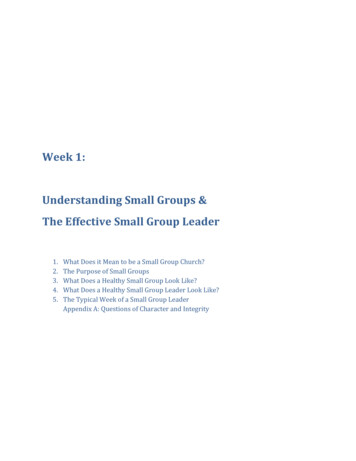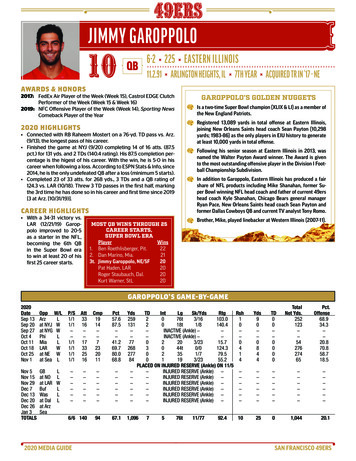
Transcription
Week 1:Understanding Small Groups &The Effective Small Group Leader1.2.3.4.5.What Does it Mean to be a Small Group Church?The Purpose of Small GroupsWhat Does a Healthy Small Group Look Like?What Does a Healthy Small Group Leader Look Like?The Typical Week of a Small Group LeaderAppendix A: Questions of Character and Integrity
IntroductionSmall Groups are the foundation of this church. It is important to understand the role thatSmall Groups play in fulfilling the Great Commission that Jesus gave his church. We can’teffectively make disciples for Jesus without healthy Small Groups. And we can’t have healthySmall Groups without called, effective Small Group leaders of good character who are devotedto the mission of Jesus. In this first session, we will look at the role of Small Groups and SmallGroup leaders in fulfilling Jesus’ Great Commission through the local church. We will alsoexamine what components make Small Groups healthy and effective.1. What Does it Mean to be a Small Group Church?Followers of Jesus are not called to simply be weekly church attendees. Disciples are calledto learn the truths of the bible, live out the message of Jesus, and mature into peoplewhose lives demonstrate the love of Jesus to those who do not yet know him. This church isset up to fulfill this mission through the Small Group structure. Small Groups provide a safeplace for disciples to pursue Jesus and be connected in genuine, transparent relationships.A Small Group church is distinct from the traditional church structure in many ways.Traditional churches come in different shapes and sizes but there are a few common typesof churches that have different sets of values than the structure we value as a Small Groupchurch. Here are some distinctions between traditional churches and a Small Group church.a. The Megachurch (See Figure 1)1. Generally defined as having more than 2,000 weekly attendees, the megachurch is achurch that is so large that relationships tend to be impersonal and interaction withothers is low. There is a “shopping mall” feel where people are accustomed towalking past people with no interaction.2. The emphasis is on great programs and high production value in the Sunday morningservice.3. Preaching tends to come from a single “superstar” pastor and often extends throughcampuses and live streaming.4. Small Groups are numerous but are often hobby-driven or special interest based.These types of Small Groups are often temporary bible or book studies and closed tonew guests. They aren’t designed to foster deep relationships.1
b. The Neighborhood Church (see Figure 1)1. The neighborhood church can be under 100 to several hundred attendees. There isa high relational, close-knit feel due to small size but relationships tend to be inwardfocused, making it difficult for newcomers to break in.2. The Sunday morning service is the foundation for ministry and relationship.3. Preaching tends to cater to the needs of the members of the church with little or nointentionality about speaking to those who are not yet “in.”4. Small Groups are optional or non-existent.Figure 1 – The Traditional Church Structurec. The Small Group Church (See Figure 2)1. The Small Group church as we understand it doesn’t continue to grow bigger andbigger. As Small Groups grow, leaders are identified and trained so the Small Groupmultiplies to make more groups. As more Small Groups come into existence, pastorsare identified and trained to form Discipleship Communities. As DiscipleshipCommunities grow and multiply, the church is prepared to multiply through churchplanting. The Small Group church reproduces itself through church planting, sendingdisciples to new cities rather than growing ever larger.2. Small Groups are the church, not a ministry of the church. The Sunday morningservice is a gathering of Small Groups, friends, and guests.3. Preaching has specific personal application to a wide variety of people. In addition,there is a lot of one-on-one and interpersonal communication outside of the Sundaymorning preaching.4. There are many leaders, many serving, and no superstars.2
5. Relational leadership ensures that the church is being loved, healed, cared for andtrained to serve others.6. Evangelism, ministry, and care-giving are relationship based and the responsibility ofevery maturing believer.7. The Small Group structure provides a framework to reach many while maintainingreal relationship.Figure 2 – The Small Group Church Structure2. The Purpose of Small GroupsThe purpose of our Small Groups is to help us fulfill Jesus’ mission to make disciples of allnations, to baptize them and teach them to live out his commandments (Matthew 28:1620). We believe that Jesus has called our network of churches to:a. Reach the un-churchedThe church is to be a place where those who don’t yet know Jesus can come and hearabout him, and be saved and changed by him.b. Reach studentsWe are called to reach students in university cities. The university students are thechurch, not a subset of the church.c. Reach people from other ethnicities and nations in our communitiesGod’s heart is for all the nations and the church must reflect the ethnic diversity in ourcommunities.3
The model for how we accomplish our purpose in Small Group is provided by the bible. Thesnapshot of the early church provided in Acts 2:42-47 gives us a picture of disciples growingin the midst of a healthy, relational local church.a. Bible Discussion (v. 42)We teach people how to read, understand, and apply the bible to their lives.b. Prayer and Caring (v. 42-45)We pray, expecting that the Holy Spirit will show up and that our prayers will beanswered. The needs of group members are met.c. Relationships (v. 46)We develop genuine love for others in the group as we spend time doing life together.d. New Friends and New Groups (v. 47)God saves our new friends and we multiply groups to make room for more.3. What Does a Healthy Small Group Look Like?Our Small Groups must be healthy if we are to be effective at fulfilling Jesus’ mission ofmaking and maturing disciples. Our goals are that every Small Group will:a. Have healthy, maturing disciplesA healthy Small Group will be making disciples. Maturing disciples will begin to:1. Grow in love for God (read the bible, pray, worship).2. Grow in love for each other (transparency, honesty, caring).3. Demonstrate Christian maturity (repentance, obedience, lifestyle changes, devotion).4. Share Jesus with friends (invite to group, Sunday service).5. Use their spiritual gifts to serve (in the church, others daily).b. Be supported by a core of disciplesMaturing disciples will begin to form a reliable core of help and support for the leader.c. Have a next leader identifiedFuture leaders will be identified from among the core. They will be trained with thehelp of an overseeing pastor.d. Be part of a larger visionA healthy group understands that it is part of a larger vision, under the authority of andassisted by the Discipleship Community pastor.e. Work towards group multiplication (See Figure 3)The goal for each Small Group is growth in numbers, leading towards multiplication.4
Figure 3 – Our Goals for Small Group MultiplicationBible discussionsCommunity growingRelationships buildingSmall Groupbegins with5-8 peopleGrowth and MaturityCore developingLeaders identifiedNext leader trainingPeople addedCore developedLeader trainedGroup multipliesTwo Small GroupsEach with 6-8 people9 – 12 month Small Group multiplication timelineIt is very important to note that while ordinarily health leads to growth, there are timeswhen things don’t seem to be happening as much or as well as we’d like. The chart aboverepresents an ideal but we recognize that there are often exceptions. Much is to be said forfaithfulness when things don’t seem to match the ideal. Sometimes God is buildingcharacter in us by asking to take care of the small things, so that with an increasedcharacter he can entrust us with bigger things (See Luke 19:11-27).4. What Does a Healthy Small Group Leader Look Like?A healthy and effective Small Group can only be led by a healthy Small Group leader.Healthy Small Group leaders are people of good character who have been called to lead andhave demonstrated commitment to Jesus’ church.a. The Healthy Small Group Leader has Good CharacterWe value character over gifting. For a group leader to be effective, they must love Jesusand live in obedience to his words. The biblical description of character requirementsfor deacons (including Small Group Leaders) is found in 1 Timothy 3:8-13.1. Lifestyle of consistent Christian character (v. 8)i. Are you free from lifestyle habits not conducive to the Christian life?ii. Are you pursuing a lifestyle of transparency and confession?iii. Are you open to talking with your DC pastor when things need to be addressed?2. Clear conscience regarding your faith (v. 9)i. Do you believe the bible in unity with the church?ii. Do you make time for personal worship, prayer, and bible reading?5
3. Tested and blameless (v. 10)i. Are you teachable, trustworthy, and willing to be accountable?ii. Are you working through the Questions of Character and Integrity (Appendix 1)4. Healthy family life if married (v. 11-12)i. Is your personal/family life in order?ii. Are you leading your wife and children appropriately?b. The Healthy Small Group Leader is Called to Lead Small GroupYour leaders are careful to spend time in prayer and testing before considering anyperson for Small Group leadership. This is done in cooperation with your DiscipleshipCommunity pastor. Small Group leaders are not self-appointed but rather agree withthe pastors that they are called by Jesus to serve in this capacity. Potential groupleaders should prayerfully consider this calling. Sometimes leaders may be scared oruncertain, but willing to trust God and their leader’s discernment (Deuteronomy 31:7-8,1 Chronicles 28:20, 2 Timothy 1:6-7).c. The Healthy Small Group Leader is Committed to Jesus’ ChurchSmall Group leaders must demonstrate commitment to the local church they serve.Leaders must:1. Have personal ownership of the vision and values of the church.i. Do you know and agree with the things Jesus called this church to do and be?ii. Are you pursuing those things and encouraging your Small Group to as well?2. Trust pastors and the church.i. Do you believe that Jesus has called the leaders who serve you (Acts 20:28)?ii. Do you trust the leaders Jesus has established in the church (Hebrews 13:17)?iii. Do you refuse to engage in criticism or gossip (James 4:11, Ephesians 4:29)?iv. Do you deal with conflict biblically (Matthew 18:15-20)?3. Be an active part of the church.i. Do you pray for this church regularly? (Colossians 4:2-4)ii. Do you give your tithes and offerings consistently, cheerfully, and generously (2Corinthians 9:6-15)?iii. Do you make attendance at Sunday service, Team Meeting, Small Group, andRetreats/Conferences a priority (Acts 2:42, Hebrews 10:25)?5. The Typical Week of a Small Group LeaderLeading a healthy and effective Small Group involves more than running an effectivemeeting. In addition to the time spent at Small Group, how should you be spending yourtime in order to be effective in making disciples for Jesus?6
a. Be prayerfulYou must be a person who prays! Set aside time daily to pray for each person in thegroup. This will make your interactions more effective. You will have more vision as youpray for the purpose, expansion, and direction of the group.b. Prepare for bible discussionsMake time to pray and study the passage for bible discussion. Good preparation willallow you to follow the Spirit’s direction more effectively. Last minute preparation leadsto unhelpful, often directionless, discussions.c. Plan meetings and small group eventsEffective meetings must be planned in advance. Core group members can help withhosting, coordinating events, planning a snack rotation, checking in with childcareworkers, etc. A good group leader doesn’t do it alone.d. Care for the people in your groupTo be effective you must find a way to be in touch with group members during theweek. Phone calls and texts go a long way in helping people stay connected. In additionto the small check-ins throughout the week, set aside one evening a week to spend timewith group members (dinner, coffee, dessert, etc.) talking with them about their life andrelationship with Jesus. Take time to pray for them and bring a next leader with you!e. Spend time with people who are not yet ChristiansSet aside time for friends who are not yet Christians. If you’re not sharing Jesus withpeople, the members of your group will not do it either.f. Raise up a new leaderYou must plan for the multiplication of the group. Be listening to the Holy Spirit’sdirection and talking with your DC pastor about who your next leader may be. Talk withthis person about the group, how it functions, why we do what we do, etc.g. Stay connected with your Discipleship Community pastorBeing open and talking with your DC pastor, about your successes and your struggles,will help them to coach you effectively. Good communication between Small Groupleaders and DC pastors is a vital link for pastors to really know how to best support you.ConclusionHealthy Small Groups led by healthy leaders are crucial in the church’s ability to fulfill Jesus’mission. While an effective Small Group is much more than a good meeting, the Small Groupmeeting is the primary time when these purposes come together. We turn to leading the SmallGroup meeting in our next session.7
Appendix AQuestions of Character and IntegrityThese questions are intended to help you identify areas in which you still need healing and tohelp us know how to best support you in the process. It is not meant to disqualify you fromserving as a leader. We just want to know that you are reasonably free from moral/lifestyleissues that would make it difficult for you to lead effectively. We frequently see potentialleaders who are honest about an area of sin or temptation when answering these questionsthat get help and go on to lead a group with great effectiveness. Let the Holy Spirit do his workin you as you honestly search your heart. Tell me your story (past, struggles, salvation and hopes of what Jesus will do with yourlife).Describe good and bad prior church experiences.Describe a time when you had to be corrected by your leader.What is one area that you have had a hard time agreeing/trusting at this church?Describe your time in the bible, worship, and prayer.Do you give at least 10% of your gross income to God’s work at this church? How longhave you been consistent in this? Are you growing in generosity?In what areas are you currently serving at this church? Do you look for opportunitiesand enjoy serving others?Do you enjoy having people in your personal living space?Do you have at least one Christian friend in our church with whom you share your goodnews, struggles, and problems? If yes, whom?Do you have any sins for which you have not asked forgiveness?Do you need to forgive or ask forgiveness of anyone?Have you been with anyone of the opposite gender, or same gender, in any context thatcould be seen as compromising?How are you doing with sexual temptation?Do you feel like Jesus is asking you to serve as a leader?8
Biblical Qualifications“8Deacons likewise must be dignified, not double-tongued, not addicted to much wine, notgreedy for dishonest gain. 9 They must hold the mystery of the faith with a clearconscience. 10 And let them also be tested first; then let them serve as deacons if they provethemselves blameless. 11 Their wives likewise must be dignified, not slanderers, but soberminded, faithful in all things.12 Let deacons each be the husband of one wife, managing theirchildren and their own households well. 13 For those who serve well as deacons gain a goodstanding for themselves and also great confidence in the faith that is in Christ Jesus.” (1Timothy 3:8-13) One of the first qualifications for a deacon is that they are to be dignified, “live in a waythat is worthy of respect.” Are there any areas of your life that would cause people tolose respect for you? How is your work ethic? Currently what are some areas that youare struggling/growing in?Are there any areas where you words would dishonor Jesus (gossip, cussing, crudejokes)?How do you handle alcohol? Do you have any addictions?Have any of your financial dealings lacked integrity? How do you do with materialism?Is there anything that is weighing on your conscience that you need to talk about?If married, how is your wife doing in these areas?Marriage and family is first. How do you do leading your family? What is next for you asa family?9
A healthy and effective Small Group can only be led by a healthy Small Group leader. Healthy Small Group leaders are people of good character who have been called to lead and have demonstrated commitment to Jesus' church. a. The Healthy Small Group Leader has Good Character We value character over gifting. For a group leader to be effective .










